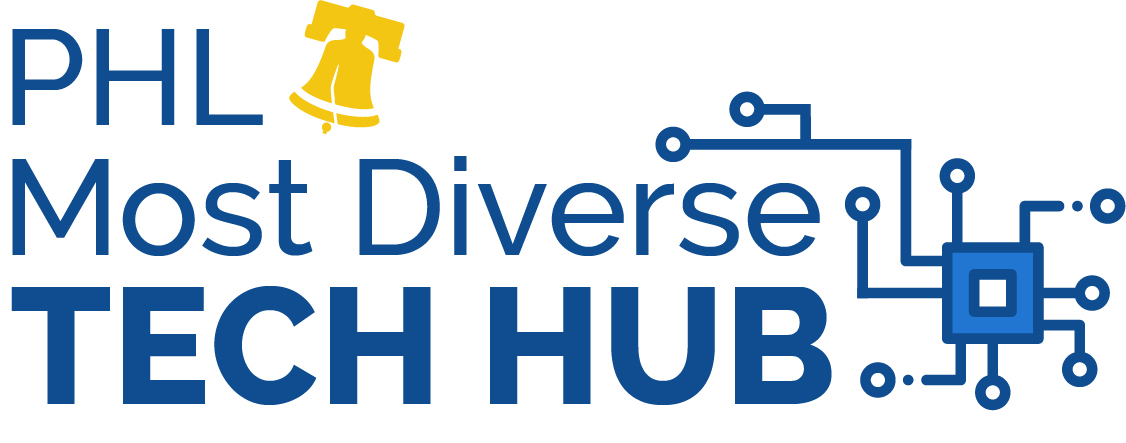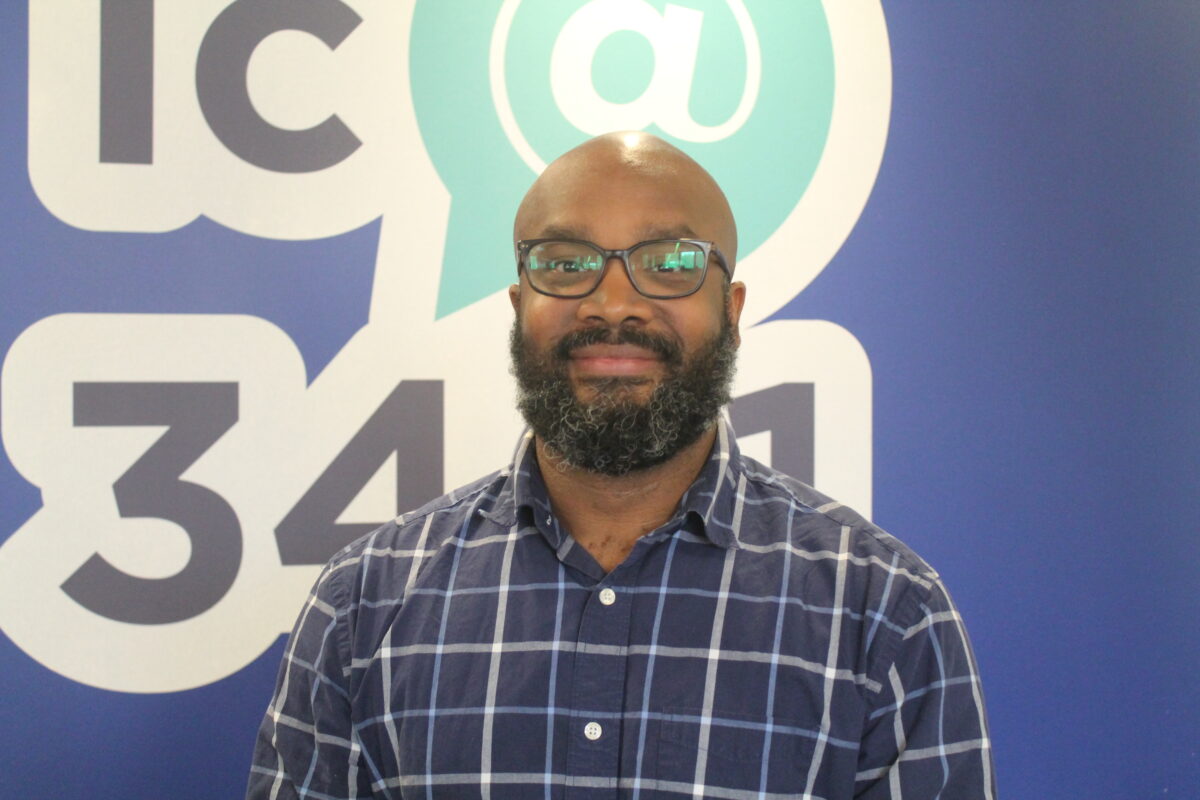Morton, 37, studied computer engineering at the University of Maryland Baltimore County for his undergraduate degree, where he focused on digital signal processing. He followed with graduate school at Drexel University, studying music and entertainment technology. After earning his Ph.D. in 2016, he worked as a research assistant at Drexel’s ExCITe Center for two years with a focus on STEAM education programs.
The West Philly resident told Technical.ly that at the time, he knew he wanted to do work that made a real impact. While in grad school, Morton thought he wanted to go into engineering education, where he would help teachers learn how to teach future engineers. But he had trouble gaining the teaching experience he needed to enter that field.
By chance, he met the CEO of Lithero, a Philadelphia-based AI company that reviews marketing materials for drug companies, through a church event, and started working with the company as an advisor before coming on full time in 2019 as VP of AI innovation. Here’s a look at how Morton made the switch from academia to corporate, and how his tech career has gone so far. This Q&A has been edited for length and clarity.
###
Technical.ly: What interested you about tech?
Brandon Morton: I think the main reason was, you get really quick feedback on whether something you’ve built works or not. For most things, it’s pretty cut and dry — either it does what you design it to or it doesn’t. And I liked that aspect of being able to get quick feedback.
I’ve always been interested in computers and technology. As a kid I grew up in the height of the video game era, so always sitting down on the Sega Genesis and playing games wondering how they worked and how people programmed them and my dad had access to a computer when I was younger which was kind of rare. So I got to play around with that, programming stuff and getting my name to print across the screen.
What does your role entail?
I am responsible for developing the analytical back end, so, the part of the system that basically looks at documents and gives comments back to the users about any compliance issues that they may find, which includes a lot of artificial intelligence models that we’re using. It also includes some different architectures, network wise and things like that. I’m basically in charge of all the AI stuff in the backend of the system.
How would you describe your role to a kid?
If I was explaining what I did to my daughter, I would say that daddy works with computers. He helps people make sure that the drugs that you get, the medicine and things like that, are safe to use by making sure that they’re saying all the right things about what they’re supposed to be talking about.
What about your current role excites you?
From a technical standpoint, I really like it because it’s an interesting problem to solve. I like the startup aspect of it, because it’s a small team. So everything I touch the user eventually sees, so it’s very impactful, the work that I’m doing. We’ve heard people say that they’ve shaved hours off of the things that they’re doing. People have said that “I can’t work without this anymore, I need this to do my job effectively.” So it’s just really nice to hear those things, that you’re building something that is useful for people and like really helps them and saves them time and gives them some of their life back.
From a technical standpoint, we get a chance to play around with a lot of the latest AI technology and try different things and see if it works for us or not. I think it’s a good gig for somebody that likes to do a lot of things. You really get a chance to try everything when you do work with a startup, especially an AI startup.
What challenge from your career sticks out to you?
There was a transition between being mostly academia and going into a more corporate setting where the goals for academia and corporate work are similar, but they are different. Academics is all about creating new knowledge and then being able to share that with people, not necessarily profit driven. Whereas in the corporate world, a lot of it is results driven.
In academia, it was all about how we got there and why it’s doing what it’s doing. And making things accurate is important, but it’s not the only method, it’s not the only pathway to success in terms of research and publishing and things like that. Whereas in the corporate world, if you don’t generate your results or you don’t deliver on your deadlines and things like that, the customer is like, “I don’t care that you know how to explain this. I don’t have what I paid you for.” So, trying to kind of make sure that I’ve balanced out the research side, which I was kind of hired for, with the more corporate demands and things like that, has been something that I’ve had to become better at balancing out.
What advice would you give to an aspiring technologist?
I tell people that being able to communicate is way more important than you think it is. So when you’re picking up your skills, and you’re learning and things like that, make sure you take opportunities to present. And if you’re not a good presenter, they have programs and stuff out there that help people learn how to present, how to talk in public and things like that. Please, please, please take advantage of it. I think a person who is very technical and can explain what they’re doing in a wide variety of areas can prevent a lot of issues.
When you’re in school, get into something other than a technical field. I’m a big fan of combining any art — whether it’s music or visual arts or theatrical arts, even — combining those things with engineering, I think, it makes you a more complete person. You have a lot more to present to somebody when you’ve kind of seen both sides of the coin. I always tell people to take some time to develop an art-based hobby, as an engineer, you will not regret it.
And then I tell people to teach, and give back and teach whenever you have the opportunity. Some of the most rewarding things I’ve ever done have been mentoring young kids or going back to speak at a school program or something like that for middle school students. Because you never know what you say may help somebody get some clarity on what they’re looking for in terms of career or they may not even know that it was possible to do the things that you’re talking about, especially kids of color. So being able to go back and say, “Hey, it’s possible. These careers exist. You can do these things, I did it, you can do it.”
Do you have an art-based hobby?
I was into DJing for a while. Obviously I really like music and influence. Being able to find samples and then being able to introduce people to music, say, “You like this song, this song was based on this.” I really, really got a kick out of that. I’m also a big fan of cooking — culinary arts, and home brewing. I actually make my own beer. I consider those arts because [they’re] artistic ways to express yourself, get some ideas that you have in your head, out into the world.
Sarah Huffman is a 2022-2024 corps member for Report for America, an initiative of The Groundtruth Project that pairs young journalists with local newsrooms. This position is supported by the Lenfest Institute for Journalism.
This article appears as part of the Most Diverse Tech Hub initiative and is underwritten by the City of Philadelphia Department of Commerce. It was independently reported and not reviewed by this partner before publication.
Before you go...
Please consider supporting Technical.ly to keep our independent journalism strong. Unlike most business-focused media outlets, we don’t have a paywall. Instead, we count on your personal and organizational support.
3 ways to support our work:- Contribute to the Journalism Fund. Charitable giving ensures our information remains free and accessible for residents to discover workforce programs and entrepreneurship pathways. This includes philanthropic grants and individual tax-deductible donations from readers like you.
- Use our Preferred Partners. Our directory of vetted providers offers high-quality recommendations for services our readers need, and each referral supports our journalism.
- Use our services. If you need entrepreneurs and tech leaders to buy your services, are seeking technologists to hire or want more professionals to know about your ecosystem, Technical.ly has the biggest and most engaged audience in the mid-Atlantic. We help companies tell their stories and answer big questions to meet and serve our community.
Join our growing Slack community
Join 5,000 tech professionals and entrepreneurs in our community Slack today!

The person charged in the UnitedHealthcare CEO shooting had a ton of tech connections

Delaware students take a field trip to China using their tablets and ChatGPT

Northern Virginia defense contractor acquires aerospace startup in $4B deal




